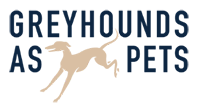Through our collaboration with GAP, Kotuku Foundation Assistance Animals Aotearoa (KFAAA) personnel have been immensely impressed with GAP's wonderfully diverse and dedicated community, united by the goal to realise all that is great about Greyhounds.
This is a particular synergy with our endeavours, since we were established in essence to assist those in our community (both human and animal) who would otherwise not be helped. To this end, we have a commitment to source all the dogs we prepare for a 'new leash on life' as Assistance, Therapy or Skilled Companion animals from existing populations. Whilst Greyhounds might not immediately come to mind as Disability Assistance dogs of choice, the breed has many qualities which fit it ideally for this and related roles in Animal Assisted Intervention or Skilled Companion work, as our two gorgeous GAP recruits Lola and Snowflake have demonstrated, and as we hope in future many more will do.
Integral to the training and placement of our dogs are our foster-trainers. Accepting this specialised role is not for everyone, but for those willing and able to take on the challenge of working closely with a dog on a daily basis with the ultimate goal of transforming (and potentially saving) the life of an individual with disabilities or dysfunctions, the rewards are great.
We are always looking for further recruits to join us in this wonderful work, but whilst many people like the idea of foster-training one of our dogs, they often lack an insight to the realities of the role and wonder what it involves. It is not dissimilar to foster caring for GAP, but the nature of our work means the commitment is usually longer-term with definitive parameters around training and socialising the dogs.
Candidates interested in this role should be:
1) Able to pass GAP adoption criteria and home check.
2) Ideally experienced with Greyhounds or if not, then with other breeds and confident and successful with basic training commands (eg down, sit, stay, heel, come, leave, drop, fetch etc).
3) Willing and able to put in the time and effort to follow the programme of training prescribed by our canine training advisor.
4) Able and willing as and when required (within reason) to transport the dog to and attend training sessions with our trainer at Ellerslie or elsewhere in Auckland.
5) Prepared to accept that whilst a bond may form during the fostering/training process, the dog will eventually be placed elsewhere and as such, should be aware the arrangement (whilst long-term) is not permanent and at some point the dog will move on from their care.
6) Thoroughly dedicated to the task, understanding that there is a huge investment in the sourcing, training and placement of our types of dog and any disruption to foster care/training is potentially detrimental to all concerned. It is preferable NOT to commence foster-training at all, than take on the task only to subsequently let others (both human and canine) down through a change of heart, or inability to meet the requirements.
We acknowledge the immense contribution our foster-trainers make not only to our work, but to the lives of others. Whilst our dogs are in foster-training their food, veterinary and (where necessary) temporary kennelling expenses are covered and all their equipment is supplied.
Aside from the knowledge they are involved in a process which will ultimately give a person with disabilities or dysfunctions increased independence, a sense of confidence and security and the ability to realise their full potential, foster-trainers for KFAAA also benefit from the tangible opportunity to gain considerable knowledge, skills and experience from our outstanding trainer, Flip Calkoen, who has a lifetime of experience in many fields of canine work.
Each and every one of our volunteers is valued for their support, which enables us to undertake the work we do. Those who take on this role agree that what they gain from such self-less dedication far outweighs mere monetary return and this is supported in literature on positive outcomes for volunteers (Jenkinson et al, 2013; Szalavitz, 2013).
Snowflake's foster-trainer (and dedicated blog author), Vicki Parry has been kind enough to share her thoughts on the experience:
Foster-training Snowflake was an opportunity that we were fortunate to be given. She reminded us daily that through love and patience, greatness grows. Foster-training isn't a light undertaking. It is a full-time role that requires significant dedication; you are training a dog that could one day save its owner's life.
Four months ago we were given a very different dog to the dog that Snowflake is today. Foster-training enabled us to watch a timid dog transition into a dog brimming with confidence, eyes sparkling with the joy of her new-found life. Snowflake introduced us to people we would never have otherwise met. She touched us, and through her we have touched the people she will go on to assist.
Foster-training comes with the responsibility of training a dog that must be exceptional and willing to work through scenarios that we do not expect our pets to undertake. At the end of the day, this dog is not your pet and will leave your home after the many hours of documented training sessions and continuous dedication you have provided. There will be a gap left in your home, but your heart will be fuller for knowing that the dog goes on to greatness. You have trained a dog that needed you, who will go on to represent the KFAAA (Kotuku Foundation Assistance Animals Aotearoa) and GAP (Greyhounds as Pets) and assist those in need.
If you are interested in foster-training for KFAAA or would like to learn more about the role, you can reach us on +64 21 298 4741 or email kotuku_foundation_aaa@hotmail.com
